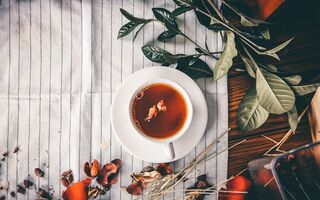Anxiety
10 Anti-Anxiety Teas
Discover what the science says about how certain tea herbs can promote calm.
Posted July 11, 2022 Reviewed by Michelle Quirk
Key points
- Caffeinated teas can contribute to anxiety.
- Some teas may improve sleep and reduce stress and anxiety.
- The scent of some teas can be calming.

Did you know that some teas can contribute to feeling anxiety (i.e., caffeinated teas like black tea and green tea) while other teas relieve anxiety? If you’re feeling stressed, an easy way to calm down can be through tea. So here are the teas that science says may help you calm down:
1. Passionflower tea
Research has shown that passionflower can improve sleep1 and help people better manage anxiety.2 Passionflower can be a bit bitter, so you may want to mix it with other teas.
2. Peppermint tea
The smell of peppermint tea has been suggested to reduce depression and anxiety.3
3. Chamomile tea
Chamomile is long thought to be a soothing, calming tea. Indeed, research suggests that long-term use of chamomile can reduce anxiety symptoms.4
4. Dandelion root tea
Dandelion root tea isn't often considered a calming tea, but if you've been stressed out for a long time, dandelion tea may be exactly what you need. It helps cleanse the liver and increase bile production. So if your stress has been messing with your digestion or your life, try dandelion tea.
5. Ayurvedic detox tea
Another calming tea is Ayurvedic detox tea. It's a mix of herbs that help the body detox. And when the body has fewer toxins to deal with, it can relax more easily.
6. Lavender tea
Lavender has been linked to stress reduction and calmness. But it's important to keep in mind that lavender may have estrogenic properties.5 So if you have any signs of estrogen dominance or other hormonal issues, you might want to stay away from lavender.
7. Lemon balm tea (Melissa tea)
Lemon balm appears to be effective in reducing anxiety and depression symptoms. It appears to work by boosting GABA.6 So if you think your anxiety is related to low GABA, lemon balm tea may be a good tea for you.
8. Ashwagandha tea
Ashwagandha is an adaptogen. Adaptogens are herbs that are thought to be effective in reducing stress and anxiety. This is why Ashwagandha tea may indeed be a good tea for calmness.
9. Milk thistle tea
Milk thistle is another detox herb that can help the body rid itself of toxins. So, although the calmness-inducing effects might not be immediate, milk thistle can help relieve stress in the body.
10. Green tea
Green tea is high in L-theanine, an amino acid that might reduce anxiety.7 However, green tea is high in caffeine, and caffeine is a known anxiety producer. Green tea is also high in quercetin. Because quercetin has a catechol structure, it is processed by our bodies in the same way as epinephrine and norepinephrine. If our bodies are busy processing quercetin, we may have a hard time processing these other stress chemicals, So we might choose an L-theanine supplement instead of green tea, or at least opt for decaf green tea.
Adapted from an article published by The Berkeley Well-Being Institute.
References
1. Ngan, A., & Conduit, R. (2011). A double‐blind, placebo‐controlled investigation of the effects of Passiflora incarnata (passionflower) herbal tea on subjective sleep quality. Phytotherapy Research, 25(8), 1153-1159.
2. Dantas, L. P., de Oliveira-Ribeiro, A., de Almeida-Souza, L. M., & Groppo, F. C. (2017). Effects of passiflora incarnata and midazolam for control of anxiety in patients undergoing dental extraction. Medicina oral, patologia oral y cirugia bucal, 22(1), e95.
3. Vaezi, A. A., Parizi, S., Vahidi, A. R., & Tavangar, H. (2017). Study the effect of inhalation of peppermint oil on depression and anxiety in patients with myocardial infarction who are hospitalized in intensive care units of Sirjan. Journal of Medicinal Plants, 2(62), 55-62.
4. Mao, J. J., Xie, S. X., Keefe, J. R., Soeller, I., Li, Q. S., & Amsterdam, J. D. (2016). Long-term chamomile (Matricaria chamomilla L.) treatment for generalized anxiety disorder: A randomized clinical trial. Phytomedicine, 23(14), 1735-1742.
5. Ramsey, J. T., Li, Y., Arao, Y., Naidu, A., Coons, L. A., Diaz, A., & Korach, K. S. (2019). Lavender products associated with premature thelarche and prepubertal gynecomastia: case reports and endocrine-disrupting chemical activities. The Journal of Clinical Endocrinology & Metabolism, 104(11), 5393-5405.
6. Yoo, D. Y., Choi, J. H., Kim, W., Yoo, K. Y., Lee, C. H., Yoon, Y. S., ... & Hwang, I. K. (2011). Effects of Melissa officinalis L.(lemon balm) extract on neurogenesis associated with serum corticosterone and GABA in the mouse dentate gyrus. Neurochemical research, 36(2), 250-257.
7. Higashiyama, A., Htay, H. H., Ozeki, M., Juneja, L. R., & Kapoor, M. P. (2011). Effects of l-theanine on attention and reaction time response. Journal of Functional Foods, 3(3), 171-178.


